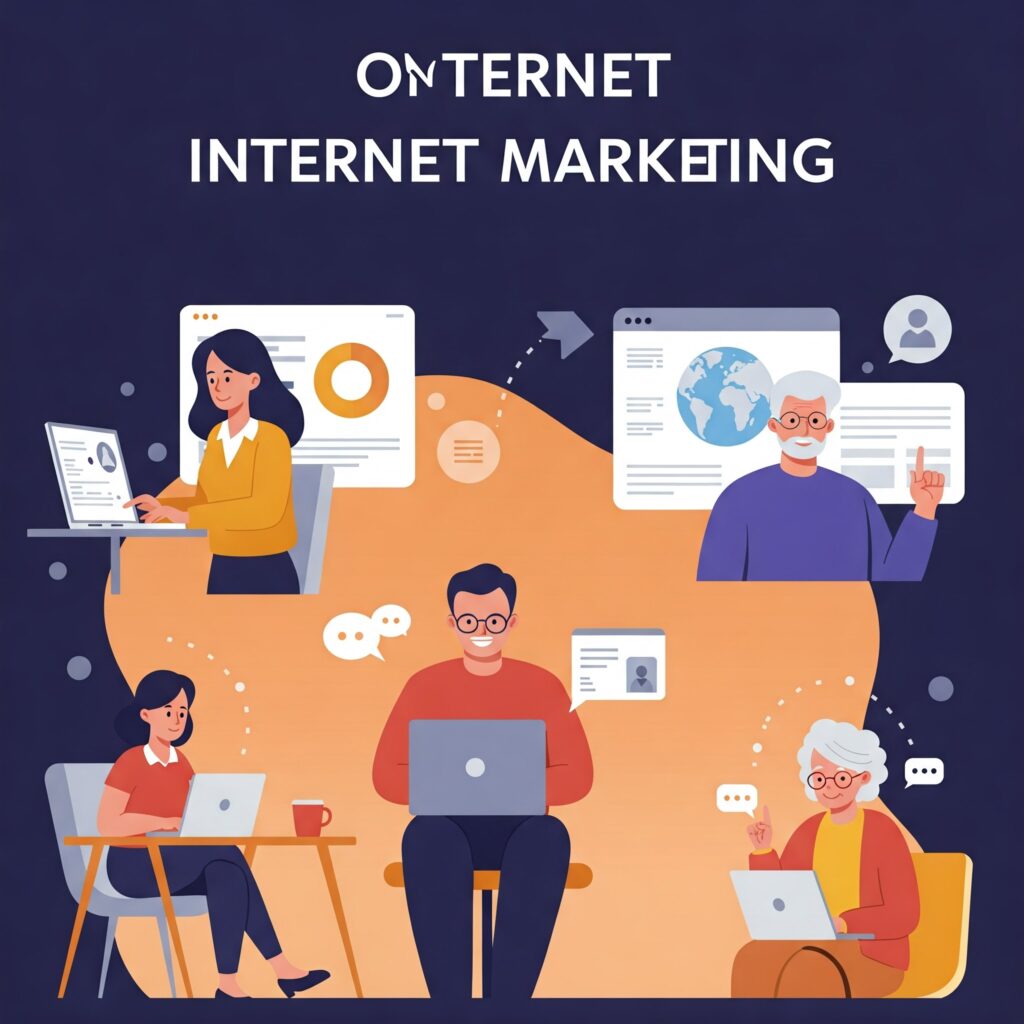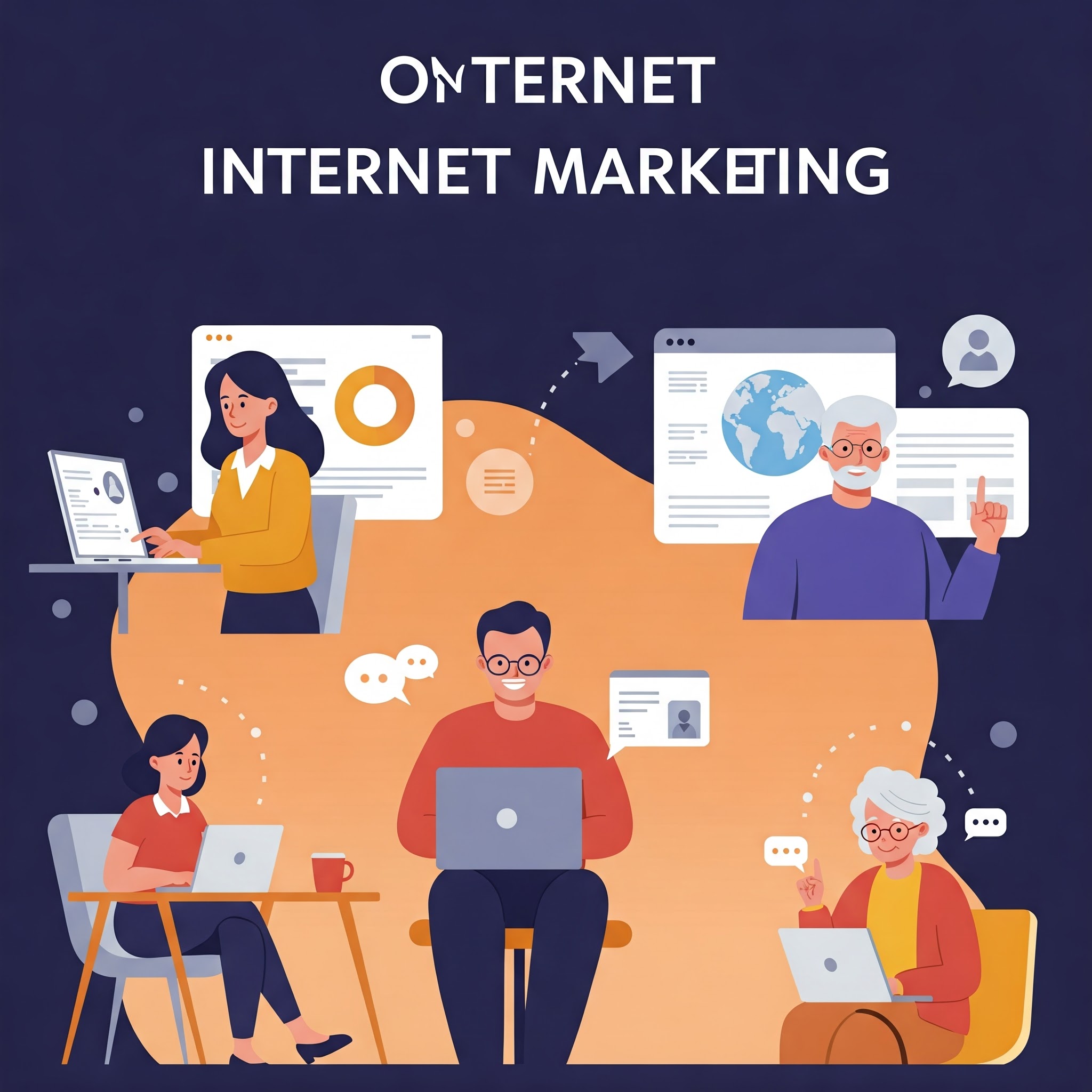In the modern digital landscape, internet marketing has become an indispensable tool for businesses aiming to reach and engage their target audience effectively. With the rapid growth of technology and increasing online consumer behavior, internet marketing offers businesses unparalleled opportunities to expand their brand presence, boost sales, and achieve long-term success.
What is Internet Marketing?
Internet marketing, also known as online marketing or digital marketing, refers to the strategies and techniques used to promote products and services via the Internet. It encompasses a wide range of methods, including search engine optimization (SEO), social media marketing, email marketing, content marketing, pay-per-click (PPC) advertising, and affiliate marketing. By leveraging these digital channels, businesses can attract, convert, and retain customers more efficiently than traditional marketing methods.

Key Components of Internet Marketing
Search Engine Optimization (SEO)
SEO is the process of optimizing a website to improve its visibility on search engines like Google and Bing. By incorporating relevant keywords, creating high-quality content, and building authoritative backlinks, businesses can enhance their organic search rankings and attract more visitors. Additionally, local SEO strategies help businesses target customers in specific geographic locations, making it easier for small businesses to compete with larger enterprises.
Social Media Marketing (SMM)
Social media platforms such as Facebook, Instagram, Twitter, LinkedIn, and TikTok play a crucial role in internet marketing. Businesses use these platforms to engage with their audience, share content, and build brand loyalty. Paid advertising on social media further enhances visibility and reach. Additionally, social listening tools allow businesses to monitor conversations about their brand and industry trends, enabling them to adapt their strategies accordingly.
Content Marketing
Content marketing focuses on creating and distributing valuable content to attract and retain customers. Blogs, videos, infographics, eBooks, whitepapers, and podcasts are common content formats used to educate and engage audiences while driving organic traffic. A well-executed content marketing strategy positions a business as an authority in its industry, building trust and credibility among potential customers.
Pay-Per-Click Advertising (PPC)
PPC advertising allows businesses to display ads on search engines and other online platforms, paying only when users click on their ads. Google Ads and Facebook Ads are popular PPC platforms that help businesses target specific demographics and drive immediate traffic. PPC campaigns can be tailored to focus on specific keywords, customer interests, and geographic locations, ensuring that businesses reach their ideal audience.
Email Marketing
Email marketing remains one of the most effective Internet marketing strategies. Businesses use email campaigns to nurture leads, promote products, and build long-term customer relationships. Personalized emails with targeted offers significantly improve conversion rates. Automation tools such as Mailchimp and HubSpot allow businesses to segment their audiences and send relevant content based on user behavior.
Affiliate Marketing
Affiliate marketing involves partnering with affiliates who promote products and earn a commission for every sale generated. This strategy expands the brand reach and drives sales without requiring businesses to invest heavily in advertising. Successful affiliate programs can leverage bloggers, influencers, and content creators to increase product exposure.
Influencer Marketing
Collaborating with influencers who have a strong online presence can significantly boost brand credibility and awareness. Influencers help promote products to their followers, increasing engagement and driving conversions. Choosing the right influencers who align with a brand’s values and audience is key to a successful influencer marketing campaign.
Benefits of Internet Marketing
Global Reach:
Businesses can reach a worldwide audience, breaking geographical limitations and expanding market opportunities.
Cost-Effective:
Online marketing is more affordable than traditional advertising, offering a high return on investment (ROI) while reducing overall marketing expenses.
Targeted Advertising:
Digital tools allow businesses to target specific demographics, behaviors, and interests, ensuring better conversion rates.
Real-Time Analytics:
Businesses can track campaign performance and adjust strategies accordingly using data-driven insights from platforms like Google Analytics and Facebook Insights.
24/7 Marketing: Online platforms operate round-the-clock, ensuring continuous engagement with potential customers at any time.
Customer Engagement:
Social media and personalized marketing help businesses interact directly with customers, creating brand loyalty and trust
Scalability:
Internet marketing allows businesses to scale operations and expand reach effortlessly, adapting to market trends and customer demands.
Higher Conversion Rates:
Digital marketing tactics such as retargeting, A/B testing, and call-to-action (CTA) optimizations improve conversion rates and maximize sales.
Brand Authority and Trust:
Thought leadership through high-quality content, customer reviews, and social proof enhances credibility and customer confidence
Competitive Advantage:
Businesses that embrace innovative digital marketing strategies gain an edge over competitors by staying relevant and engaging with their audience effectively.
The Future of Internet Marketing
As technology continues to evolve, internet marketing will become even more sophisticated. Emerging trends such as artificial intelligence (AI), voice search optimization, video marketing, virtual reality (VR), and augmented reality (AR) will shape the future of digital marketing. Businesses that adapt to these changes and leverage advanced digital tools will maintain a competitive edge in the ever-evolving online marketplace.
AI and Machine Learning:
AI-powered chatbots, predictive analytics, and personalized recommendations will enhance user experiences and improve customer interactions.
Voice Search Optimization:
With the rise of smart assistants like Alexa and Google Assistant, optimizing content for voice search will be crucial for businesses.
Video Marketing Growth:
Short-form videos, live streaming, and interactive video content will dominate digital marketing strategies, increasing engagement and brand storytelling effectiveness.
Augmented and Virtual Reality (AR/VR):
Brands will use AR and VR for immersive marketing experiences, allowing customers to interact with products in new ways before making a purchase.
Privacy and Data Protection:
As data privacy regulations become stricter, businesses will need to adopt transparent marketing practices and prioritize consumer trust.
Final Thoughts
Internet marketing is no longer an option but a necessity for businesses looking to thrive in the digital age. By adopting effective digital marketing strategies, businesses can enhance brand visibility, engage with their target audience, and drive sustainable growth. As consumer behavior shifts increasingly toward online interactions, mastering Internet marketing will be the key to long-term business success.
Businesses that stay ahead of digital marketing trends, leverage data-driven decision-making and embrace innovation will not only survive but also excel in the competitive online marketplace. The future of marketing is digital, and those who harness its potential will unlock limitless opportunities for growth and success.
As businesses adapt to evolving data privacy regulations, the need for transparent marketing practices grows more critical. Embracing digital marketing strategies is essential for maintaining brand relevance and connecting with target audiences effectively. The shift toward online consumer interactions underscores the significance of mastering Internet marketing techniques. Staying abreast of digital marketing trends, utilizing data-driven insights, and fostering innovation are vital for thriving in the competitive digital landscape. Success in the future of marketing lies in leveraging the limitless opportunities presented by digital platforms for sustainable growth and market leadership.


